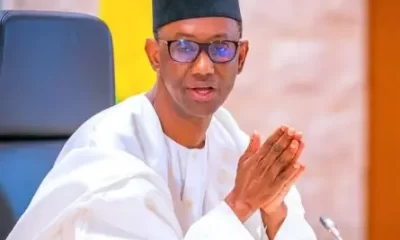Democracy & Governance
Urging Tinubu-led Government To Eschew Sarcasm In Political Discourse, And Address Public Concerns With Clarity, Sincerity, And Respect -By Isaac Asabor
Against the foregoing backdrop, it is germane to hit the nail on its head at this juncture that the inspiration to express this view came as it has been observed that the ongoing administration of President Bola Ahmed Tinubu has not been addressing public concerns with clarity, sincerity, and respect to maintain trust and effectively manage social issues.

There is no denying the fact that the use of sarcasm in addressing public concerns is fast becoming the norm, and ostensibly being integrated into Nigeria’s political communication machinery, particularly in the ongoing administration been led by President Bola Ahmed Tinubu. Without a doubt, sarcasm can serve as a social control tool and is often seen as a deviation from polite language use, intentionally employed for specific purposes. Unfortunately, it can lead to a culture of impoliteness and is sometimes considered a violation of communication ethics.
In fact, in the realm of political communication, the power of words cannot be overstated. They can inspire hope, ignite change, and foster unity. However, when wielded with sarcasm, they often achieve the opposite, sowing seeds of division, undermining serious concerns, and eroding trust in public institutions.
Against the foregoing backdrop, it is not an exaggeration to opine that Nigeria, as a nation with a vibrant political landscape, has witnessed an increasing trend of sarcasm employed by its leaders in addressing public concerns since it transited to democratic system of government in 1999. Unfortunately, this communication style has become prevalent under the current administration led by President Bola Ahmed Tinubu, and has in the same vein become a subject of contention.
At this juncture, it is germane to note that sarcasm, while sometimes used to add humor or levity to conversations, can be damaging when it comes to matters of national importance. It trivializes genuine grievances and deflects from the pressing issues at hand. In a country grappling with economic challenges, security concerns, and the quest for sustainable development, such an approach is not only inappropriate but also counterproductive.
In fact, the frequent use of sarcasm by those in power sends a disheartening message to the populace, that their worries are not taken seriously. It creates a disconnect between the government and its citizens, making it difficult to foster a collaborative environment where constructive dialogue can thrive.
Therefore, as Nigerians yearn for transparency, accountability, and effective governance, it is imperative that political leaders adopt a more earnest and respectful tone. The use of sarcasm must be curbed, replaced instead with sincere communication that acknowledges the people’s struggles and seeks to address them head-on.
Against the foregoing backdrop, it is germane to hit the nail on its head at this juncture that the inspiration to express this view came as it has been observed that the ongoing administration of President Bola Ahmed Tinubu has not been addressing public concerns with clarity, sincerity, and respect to maintain trust and effectively manage social issues.
For instance, in a statement few weeks ago while briefing a Joint Committee of the Senate on the State of the Nigerian Economy, CBN Governor Olayemi Cardoso said while the apex bank will continue to do all it can on the monetary side, it has no “magic wand“ to turn around the fortunes of the economy and the country’s currency, the Naira.
Without resort to campaign of calumny in this context, it is not an exaggeration to opine that the apex bank governor’s response to the public, at a time when the Naira was by each passing day depreciating in the foreign exchange market, was a display of biting sarcasm as the comment about Cardoso’s “Magic Wand” sharply underscores the skepticism surrounding his promises. It was a clever jab at the perceived gap between his lofty pledges and the gritty reality of their execution, even as the comment suggests that it would take nothing short of magical intervention for his words to materialize into tangible results. This sardonic remark serves not only as a critique of Cardoso’s methods but also as a broader commentary on the often disillusioning chasm between political rhetoric and practical outcomes.
In fact, not a few critics argue that such statements may reflect a defeatist attitude and could dampen public confidence in the government’s ability to effect change. Given the foregoing backdrop, it is pragmatic to remind our present leaders that it is not magic that is sought after but rather effective policies, strong leadership, and diligent governance.
Also, it is high time our leaders had it at the back of their minds that for Nigeria to navigate its economic challenges, it requires not magicians but dedicated leaders who are committed to applying sound economic principles, fostering an environment conducive to growth, and engaging with experts to devise and execute viable solutions.
At this juncture, it is germane to opine that while no one expects instantaneous economic transformation, it is reasonable for Nigerians to expect progressive steps towards improvement. Leaders must inspire confidence through action and reassurance, not by downplaying the potential for positive change.
In a similar vein, the Presidency recently reacted to a report published in the New York Times criticizing the Nigerian economy as facing the worst trajectory in a generation.
Special Adviser to the President on Information and Strategy, BayoOnanuga, reacted to the report credited to Ruth Maclean and Ismail Auwal.
According to the Presidency, the feature story with the title, ‘Nigeria Confronts Its Worst Economic Crisis in a Generation’, published on June 11, 2024 reflected the typical predetermined, reductionist, derogatory and denigrating way foreign media establishments reported African countries for several decades.
Without a doubt, the foregoing response is diversionary and sarcastic as it fails to address Nigeria’s economic realities which no doubt inspired the writers of the feature story as not a few Nigerians are aware of promises made by the president during his fervor of political campaigns, unarguably with the aim of garnering support and winning votes. Among his promises, economic revival no doubt sits at the center stage, especially as the nation at the time of the last presidential campaign needed growth and stability.
It was on such promises that President Tinubu built his campaign, assuring Nigerians that he would be the architect of a rejuvenated economy. Even, being an affiliate of the All Progressives Congress (APC) he continued thumbing up for the former president, Mr. Muhammadu Buhari, saying he was doing well as a president then. Then, how come the same president is complaining that he inherited a dead economy?
Without a doubt, the statement from the Tinubu administration, claiming to have inherited a ‘dead economy,’ has sparked debate and criticism. This stance seems to contradict the confident assurances made during the campaign trail, where there was a clear commitment to economic repair.
Critics argue that it is disingenuous for any administration to lower public expectations post-election by painting a bleaker picture than acknowledged prior. It raises questions about accountability and the feasibility of campaign promises. If an administration claims capability to fix an economy, should it not maintain that stance once in power?
At this juncture, it germane to opine that it is crucial for political leaders to align their pre- and post-election narratives. While it is understandable that the new administrations, which is now a year old, may had uncovered unforeseen challenges, the fact remains that the essence of their campaign assurances should not be negated. In fact, transparency about economic conditions and consistent communication can help manage public expectations and foster trust.
In fact, while acknowledging the inherited challenges is fair, it is equally important for Tinubu-led administration to uphold its campaign ethos. For Nigeria to progress, leaders must strive for consistency in their promises and actions, ensuring that the hope ignited during campaigns translates into tangible results for the nation.
In a similar vein, President Bola Tinubu also acknowledged the presence of poverty and suffering in Nigeria, emphasizing that these struggles are not unique to the country but are a global issue. He advised political leaders to focus on alleviating the sufferings and pains of the people, stating that poverty is not hereditary but a societal issue. Tinubu also highlighted the need to address challenges such as banditry and terrorism to allow farmers to produce food effectively.
Given the foregoing statement from the president, it is expedient to note in this context thatin addressing the complex issue of poverty, it is essential to consider a wide range of global examples, both positive and negative. However, while acknowledging the struggles faced by poverty-stricken nations can provide a realistic perspective, it is equally important to draw inspiration from countries that have successfully implemented policies to alleviate poverty. By focusing solely on nations with severe poverty issues, Tinubu-led government may overlook valuable lessons from those who have made significant progress, thereby missing opportunities to learn from diverse experiences and potentially beneficial strategies.
At this juncture, it is germane to opine that frequent sarcastic replies from the government, particularly from the presidency, can lead to misinterpretation and confusion. Again, humor has on some occasions been used by the president to explain issues of national importance to Nigerians. However, while humor can be a useful tool in communication, sarcasm is a risky strategy for government officials. Therefore, it is advisable for governments to address public concerns with clarity, sincerity, and respect to maintain trust and effectively manage social issues.










